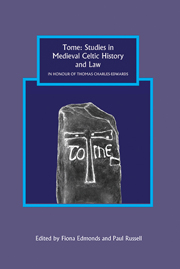Book contents
- Frontmatter
- Contents
- List of Illustrations
- Preface
- List of Contributors
- Abbreviations
- 1 Cloud-Cuckoo Land? Some Christian Symbols from Post-Roman Britain
- 2 Columbanus's Monasticism and the Sources of his Inspiration: From Basil to the Master?
- 3 Early Irish Priests within their Own Localities
- 4 Political Organisation in Dál Riata
- 5 Irish Boundary Ferta, their Physical Manifestation and Historical Context
- 6 Asser's Parochia of Exeter
- 7 Viking-Age Sculpture in North-West Wales: Wealth, Power, Patronage and the Christian Landscape
- 8 Iona v. Kells: Succession, Jurisdiction and Politics in the Columban Familia in the Later Tenth Century
- 9 A Twelfth-Century Indulgence Granted by an Irish Bishop at Bath Priory
- 10 Gerald of Wales, Gildas, and the Descriptio Kambriae
- 11 Patrick's Reasons for Leaving Britain
- 12 Learning Law in Medieval Ireland
- 13 Holding Court: Judicial Presidency in Brittany, Wales and Northern Iberia in the Early Middle Ages
- 14 The Iorwerth Triads
- 15 The Recovery of Stolen Property: Notes on Legal Procedure in Gaelic Ireland, Scotland and the Isle of Man
- 16 Contentious Kinship: The Penumbra of Established Kinship in Medieval Irish Law
- 17 Marriage by Purchase in Early Irish Law
- 18 Kingship Made Real? Power and the Public World in Longes Mac nUislenn
- 19 Mongán's Metamorphosis: Compert Mongáin ocus Serc Duibe Lacha do Mongán, a Later Mongán Tale
- Bibliography of the Writings of Thomas Charles-Edwards Maredudd ap Huw
- Index
- Tabula Gratulatoria
14 - The Iorwerth Triads
Published online by Cambridge University Press: 05 October 2013
- Frontmatter
- Contents
- List of Illustrations
- Preface
- List of Contributors
- Abbreviations
- 1 Cloud-Cuckoo Land? Some Christian Symbols from Post-Roman Britain
- 2 Columbanus's Monasticism and the Sources of his Inspiration: From Basil to the Master?
- 3 Early Irish Priests within their Own Localities
- 4 Political Organisation in Dál Riata
- 5 Irish Boundary Ferta, their Physical Manifestation and Historical Context
- 6 Asser's Parochia of Exeter
- 7 Viking-Age Sculpture in North-West Wales: Wealth, Power, Patronage and the Christian Landscape
- 8 Iona v. Kells: Succession, Jurisdiction and Politics in the Columban Familia in the Later Tenth Century
- 9 A Twelfth-Century Indulgence Granted by an Irish Bishop at Bath Priory
- 10 Gerald of Wales, Gildas, and the Descriptio Kambriae
- 11 Patrick's Reasons for Leaving Britain
- 12 Learning Law in Medieval Ireland
- 13 Holding Court: Judicial Presidency in Brittany, Wales and Northern Iberia in the Early Middle Ages
- 14 The Iorwerth Triads
- 15 The Recovery of Stolen Property: Notes on Legal Procedure in Gaelic Ireland, Scotland and the Isle of Man
- 16 Contentious Kinship: The Penumbra of Established Kinship in Medieval Irish Law
- 17 Marriage by Purchase in Early Irish Law
- 18 Kingship Made Real? Power and the Public World in Longes Mac nUislenn
- 19 Mongán's Metamorphosis: Compert Mongáin ocus Serc Duibe Lacha do Mongán, a Later Mongán Tale
- Bibliography of the Writings of Thomas Charles-Edwards Maredudd ap Huw
- Index
- Tabula Gratulatoria
Summary
Cyfraith Hywel, the law of Hywel, was the system of law followed in Wales throughout the Middle Ages; attributed to Hywel ap Cadell (Hywel Dda), d. 949 or 950, it survives in some forty manuscripts dating from the mid-thirteenth century to the fifteenth century. It was a native legal system, distinct from both English law and Canon Law; had the system survived to this day, it would be a third class of law in the United Kingdom, a Volksrecht-system to join the Scottish civil law tradition and the English common law.
The manuscripts of Welsh law divide into three Welsh groups or redactions, named after eminent lawyers noted in the prologues of each redaction: Iorwerth, Blegywryd and Cyfnerth. The Latin manuscripts form a separate group. There are eight manuscripts in the Iorwerth redaction, and they take up the first letters of the alphabet in the sigla assigned to them by Aneurin Owen. They are: Aberystwyth, National Library of Wales, Peniarth 29 (The Black Book of Chirk, Owen's A); London, British Library, Cotton Titus D.ii (B); BL Cotton Caligula A.iii (C); NLW Peniarth 32 (D); BL Additional MS. 14931 (E); NLW Peniarth 35 (G); NLW Peniarth 40 (K); and NLW Peniarth 39 (named Lew by William Maurice, it was not known to Owen). Llyfr Colan, NLW Peniarth MS 30, is a revised version of the Iorwerth redaction. The Iorwerth redaction is from north Wales and includes some of the earliest manuscripts of Welsh law; the text itself can be linked to the kingdom of Gwynedd during the time of Llywelyn ap Iorwerth and Llywelyn ap Gruffudd.
- Type
- Chapter
- Information
- Tome: Studies in Medieval Celtic History and Law in Honour of Thomas Charles-Edwards , pp. 155 - 164Publisher: Boydell & BrewerPrint publication year: 2011



